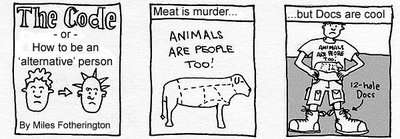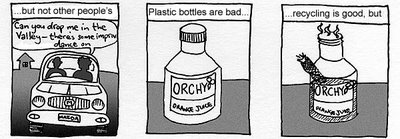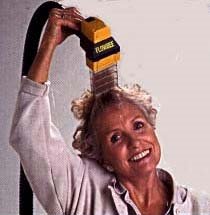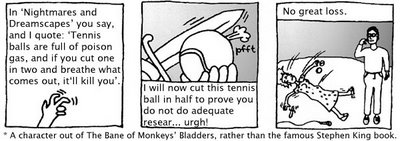Here's the transcript of my interview with
Final Impact author
John Birmingham. Feel free to sift through it, or wait for the hack 'n' slash version in
Articulate later this week!
I remember when Weapons of Choice came out you said you sent out your finished draft and it came back with a massive note..."An editor's note, at least 15,000 words long, about exactly where I had screwed up and what would be necessary to make this even vaguely publishable. It was a sobering experience."
What did you learn that you could then apply to Designated Targets and Final Impact? "I learnt a lot. That was the interesting thing. I probably learnt more writing the mass market genre books than I'd previously learned in ten years of doing middle-brow non-fiction. Apart from the historical facts I didn't learn a lot when I was doing
Leviathan because as a form of writing it was no different than anything I'd done before, it was just bigger. Whereas with the
Weapons series of books it was completely new to me. I'd read a lot of these books because I do a lot of flying and like anybody else I find them impossible to resist but I'd never written them and I went in with a dumb-arse arrogance that they would be as easy to write as they are to read and the long, long editorial note disabused me of that idea.
"I learned that you can't just make it up as you go. I remember reading, 15-20 years ago
Stephen King was talking about how he'd written
The Stand, which was one of the great early mass market epics. He eventually re-released it. It started off at 900 pages and then he re-released his director's cut, I think it blew out to 12-1,300. And I read that book three or four times when I was younger and was just impressed by the way he controlled the story. You never got the sense, despite the fact he'd literally created an entire world, you never got the sense that he was lost in it. Whereas I got lost in mine after about twenty pages.
"He had written that his planning for that story consisted of reading a newspaper story about the
Patty Hearst kidnappers. He had this flash of an idea if they were all bitten by a snake but the snake had superpowers that would protect them from some proto-bird flu that wiped out the entire population of the world. That was it, from that one, reasonably ridiculous thought he then expanded out to a 1,000 page epic and I thought that's a great idea. So
Weapons started from a very similar process. I was reading
Matt Reilly's
Ice Station when I should have been working on something much more serious and reading that I thought wouldn't it be cool to write a thriller, with aircraft carriers and everything. And because I was writing history at the time, I was writing
Leviathan, the idea crossed over in my mind. Wouldn't it be cool to have aircraft carriers before aircraft carriers were even invented - an idea as dumb as King's original seed for what became
The Stand.
"Unlike him I didn't have the chops to pull it off. I just sat down and started writing this story for fun at that point, I wasn't going to show it to anybody, because it was fun there was no pressure on to produce a coherent narrative. When it was eventually picked up by American publishers - they picked it up before Australia - I had a contract and an advance and had to start thinking about this in terms of it being an actual job I had to finish, and that was when I came acropper because I hadn't thought out how the story was going to run.
"And in fact the book is affected by that. The first book is unbalanced. The first 45,000 words describe I think 30 minutes of naval combat, and then you jump forward two weeks and you have people sitting around having a chat, and that takes another 30 or 40,000 words, then you jump forward another two weeks and you have some more naval combat so it's a very unevenly paced book and I would do it very differently now if I started all over again.
"I guess the thing I learned hard - it was a hard lesson - was that I have to plot these things out. I actually have to plot these things out with a piece of paper or a laptop or whatever and go, okay, chapter 1, the kidnappers get bitten by the snake, chapter 2, blah blah blah all the way through until the end of the book. And so I do that now, I'd never done that before. I didn't do it with
Felafel, I didn't do it with
Tassie Babes, I just pretty much let them rip."
Did you stick to your plan pretty much? "I stuck to the narrative arc. When you plot out a book like that what you construct is a story that arcs from beginning to end and you can think of it like a bridge that carries you through the narrative and the different sub-plots and characters become the struts and wiring that flesh out the structure. So what I learned was to plan that structure properly so that I didn't get three-quarters the way across the bridge and realise I've run out of material and I had no idea how I could get to the other side.
"The other thing I learned after about 18 months was just because I was writing a massive epic that spans decades and basically the globe in terms of its geographics I didn't need to keep up with the entire population of the globe, I didn't need to have six billion characters to make the story work and if you go through from
Weapons of Choice to
Designated Targets to
Final Impact you will see a progressively tighter focus on fewer and fewer characters until at the end
Impact has about four or five main characters whereas
Weapons had forty or fifty and because of that
Impact is a much easier story to read.
"I've just been plotting out the next series of books, I've just signed another three-book deal, I've taken those lessons and planned it out, not just chapter by chapter but scene by scene and I've settled on who my main characters are and I've written detailed biographies for them before I write the first scene. And those bios are quite indepth - there's one that runs to 12,000 words, so I have the characters backstory before they hit the page. It makes a huge difference because you're not left wondering how they're going to react in a situation because you already know your character intimately."
So are two set in the Weapons of Choice..."Two of them are set in the
Weapons universe, one is set on this side of the wormhole, it actually occurs before the battle group gets sucked back to 1942 and the other one will be set probably ten years after
Final Impact. So the prequel if you like is almost a straight thriller, it's what I call a sleeping killer story, I'm a huge fan of the sleeping killer genre (eg
Bourne Identity,
Long Kiss Goodnight,
Total Recall). It's where somebody comes into the world not knowing who they are, they're revealed very quickly to be a ruthless killing machine - what's not to love about that scenario?
"I'm using that as the engine of the prequel but the whole book is really a reflection on what happens to societies that spend 20 years fighting a war - you see that coming through in the
Weapons of Choice books, you see it in the emotionless, almost ethically devoid way in which the 21st century go about making war. So what wanted to do was set a story in their world, because I've had a lot of harassment from fans and stalkers about what that world is like. To me it was just an opportunity to make a lot of jokes, like you find out
Jerry Springer is a senator in that world and sits on the armed forces committee with
Bill O'Reilly from Fox News. It's just a throwaway line but it's a great little in-joke.
Rupert Murdoch is still alive, probably living off organ transplants and other people's stem cells by that point.
Is that part of the attraction of writing alternative history? Having fun with historical characters?"Well see the whole thing started as fun.
Leviathan was no fun, that was calculated effort to escape the gravitational pull of
He Died With A Felafel in His Hand, and there was no fun to be had researching it, it was like doing four PhD theses one after the other, whereas writing these books, once you learn how to do it, writing them is a bit like playing a video game, you sit down at the start of the day and start working the keyboard and on a good day you'll put your head up seven hours later on and forget you haven't had lunch."
Did you already know a lot about World War II? "No, I had vague recollections of watching
Vic Morrow in
Combat as a kid, I haven't even watched
Final Countdown. A friend of mine,
Phil McCormack, saw that movie when he was about 11 or 12, I can recall him telling me about a scene from it where jet-powered Corsairs shoot down a Japanese Zero, Phil was really impressed by that. I took away the very strong impression they didn't have any special effects budget because that's about all that happened in the movie. I didn't read a lot before I had to sit down and do the books. I probably had no more general knowledge than anybody else. You absorb a bit through mass culture but I'd never studied it at university or [inaudible] which meant when I sat down to do
Weapons of Choice I spent about 12 months giving myself a degree in World War II history, specifically about Midway.
"I also had to spend a couple of months learning how to build a time machine. I was fairly lucky, Professor
Paul Davies wrote a book just as I was setting out on my research called
How To Build a Time Machine...
"I read this thing which was beautifully written and simplified the whole process, I still had to read it six times and I had something like 40 or 50 yellow sticky notes coming out of the book, 'this is where they create the quark-gluon plasma', I managed to hold it together in my head long enough to write the scene, which took about 12 days as I recall. So there was an enormous amount of technical and historic research.
"I often say it's lucky I'm married now because if I was chasing some chick and she got a look at my bookshelf, I'd never get laid again."
You also had to research advanced weaponary? "Yeah, that was relatively easy to do. God bless the web, everything is out there now. Even the Defence Advanced Research Project Agency, which the mad scientist works for, has its own website, very kindly has all of the whizbang gear that they're working on so it was [inaudible]
"...
Weapons was quite widely read in Defence circles in Canberra and they wanted me to come in and have a chat about what cool gear they should be investing in. I went in, it was fantastic, we had morning tea, sticky buns, coffee and sat around talking about wars of the future."
Did they just invite you as a guest because you're obviously interested in that stuff? "No, these guys, they're job was to sit around thinking about literally how to fight wars in the future and they'd read the book and quite liked what they saw and asked me to come in and have a bit of a chat. I imagine they do it to lots of different people working in lots of different fields. It was a bit of a headspin, I must say, but it was a very diverting way to spend a morning and it reminds me, I'm supposed to write them a couple of thousand words and send it down to them at some point. I should get onto it."
Do you ever consider your own alternate history? What would've happened if Felafel hadn't been successful?"Sometimes I do, yeah. I quite like the alternative worlds theory. It's a great escape. You're having a particularly rough day, it's nice to imagine a world where your deadlines have always been met, your bank balance is always full, there's a long line of nubile soap stars who want nothing more than to date you and be on their way. Unfortunately I'm not sure it works that way but there is the other alternative too, which is that things may not have turned out as well as they did.
"
Felafel was written when I was teetering on the edge of abject failure as a writer because I'd been writing for about six or seven years at the point that book came out. All I wanted to do was work for magazines. I had no intention of ever writing books, no interest in it, and I'd got myself to a position where I was probably one of the most successful freelancers in the country. I could ring up pretty much any magazine I wanted to and pitch a story and they'd take it because within the confines of the industry, which is quite a little inward-looking village in Australia, I had a good reputation.
"Having said that, just before
Felafel came out a couple of magazines I worked for folded, a couple of the editors moved on and all of a sudden I was looking at my income stream contracting to a trickle and it wasn't that much of fucking mighty river to begin with. I think even at the height of my 'success' as a freelancer I was making about $12 grand a year and trying to live in Sydney on $12 grand a year is a big fucking ask. You can see how I accumulated all that life experience for
Felafel when you see how little money I made through my 20s, so I often wonder what would've happened if either I hadn't written the book or it hadn't been a success.
"And it wasn't a success for six months. For six months it just died in the arse really. It wasn't that nobody would buy it, the shops wouldn't even stock it. Poor old
Michael Duffy looked like he was going to do his dough cold, and then for whatever reason it began to sell and then it took off and exploded.
"But I guess I do know what the alternative would have been. I would have ended up like some of my writer friends who are really struggling to get by, selling fudge at the markets on the weekends to pay their electricity bill. You can do that stuff when you're in your 20s and you're single and childless and have no-one to look after or to blame but yourself but once you enter a serious relationship and start having kids then all of a sudden there are other people depending on you and the equation gets pretty fucking grim very quickly.
"So I actually don't care to think about the downside alternatives, what would've happened if Felafel wasn't written or just came out and died, which is the fate of most books, 80 per cent of them these days."
Cheeseburger Gothic seems like a nice community. It's quite personal. Do you think that's the way of the future, with authors making themselves more accessible to their fans? "It seems to be. It will be for some and not for others. A lot of authors don't cope very well with the real world, that's why they became authors. They're much better off shut up in a little room somewhere living inside their head, unless their spectacular talents it makes it very difficult for them because they find it hard pimping themselves on the publicity trail, and that makes a huge difference to sales, which affects how comfortably you get to live as a writer.
"I suspect that a lot of authors five or six years from now will have their own blogs, particularly the genre authors. There's quite a few science fiction and speculative fiction writers maintaining their own sites, which is not surprising when you think about it, you figure they're going to be au fait with new technology. Whether or not someone like
Helen Garner will ever do it, I don't know.
"I don't know whether you've been to many writers festival but there's a pretty high freak content in the audience, whether or not you'd want to be exposed to them is a big unanswered question. I like the Burger because it doesn't actually require that much input from me to keep ticking over. There are enough people visiting it every day and they have now become comfortable enough with each other that what frequently happens is I'll start some thread of a discussion and the guys will just run off with it for days at a time. We've had some threads that run to 200 messages by the time they're finished [inaudible]... it very much is a marketplace of ideas.
Also the fan fiction?"The fan fiction, that grew out of the fact that there were some editorial staffing changes at my American publisher which meant the publication of Final Impact in the US was going to be put back by six months and that was really a bit long to leave people with nothing to read in that particular fictional world so I didn't want to write anything but I just, a couple of people had inquired about whether I'd be okay with fan fiction and some people had done some pretty weird stuff.
"One guy on his computer created an illustration where he took the picture of the marines raising the flag on Iwo Jima and turned it into the moon and put them into combat suits and said it was his vision of what my book looked like and obviously a lot of work had gone into it [inaudible] ...
"I don't get uptight about intellectual property issues - it's not like they'd taken the characters and published their own book with a rival publisher, it's just a bit of fun on a website and if anything it keeps the story at the forefront of people's minds.
I wanted to ask you about your casting of Prince Harry as an SAS hero. Obviously it's a few years ago now that you made that decision, but do you think he was getting a bit of a rough trot or was it just a bit of fun. "I must say I did feel a bit sorry for Harry because he likes a drink, he likes a smoke, he likes a good looking girl - who doesn't? What was the fucking issue. He was a teenager and he was getting loaded up with a shitload of responsibility and hassles that really shouldn't be dropped on to anybody at that age.
"That's not why I put him in the book, I put him in because I thought it would be funny. It was originally just a little joke for me. I can't even recall where the idea first came from, but having decided to do it he turned into one of my favourite characters and spookily enough the real-world Harry is becoming more and more like the narrative Harry with every day that passes."
I also wanted to ask you about reviews. When Weapons of Choice came out I checked out a couple of reviews and I was almost put off because they made a big deal of the fact that you'd named people after Australian literary identities and the social interplay between the 'temps and the uptimers, which is all a part of it, but do you think it's sort of almost over-intellectualising it?
"You cannot control how people react to what you write, that's a lesson I learnt a long time ago. I've seen some frankly bizarre interpretations of my books, layers of meaning [inaudible] ... but if they're there for them, who am I to say otherwise.
"You can approach the
Weapons of Choice series on a number of levels. In the US, because I had no background as a humour writer, when it came out people did not see it against that personal history, they just read the books straight. They didn't get a lot of the jokes because they didn't see the jokes and it was odd actually to see the different reactions from the US to Australia and to a lesser extent British readers.
"They were much more serious about the stories than anybody here, an example being the fact that I'd named the aircraft character after
Hillary Clinton, which to me was just a great joke, for a lot of American readers it was totally unacceptable, 'you should never have done it, and I'll never read another of your Goddamn books ever again'. They took it really, really badly.
"I have since come to understand their psychology a little more and I think as the books continued to come out in the US people, reviewers in particular, have come to understand there's a large element of satire in them and perhaps they shouldn't take those things quite so seriously."










